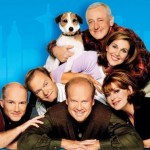
Sebastian’s back Guest-clacking for us again….
The Britannica Encyclopedia defines farce as … OK forget it, let’s just copy what Wikipedia has to say about farce:
A farce is a comedy written for the stage or film which aims to entertain the audience by means of unlikely, extravagant, and improbable situations, disguise and mistaken identity, verbal humor of varying degrees of sophistication, which may include sexual innuendo and word play, and a fast-paced plot whose speed usually increases, culminating in an ending which often involves an elaborate chase scene. Farce is also characterized by physical humor, the use of deliberate absurdity or nonsense, and broadly stylized performances.
Britannica adds:
Farce is generally regarded as intellectually and aesthetically inferior to comedy.
I thought long and hard about why Britannica labels it as inferior and I think it is because it has the distinct characteristic of “piling on,” using fecal humor and sexual innuendo.
This is funny because to me, farce is the most sophisticated kind of humor there can be on stage. To me, farce is a filigree form of art, especially embodied in two pillars of Comedy TV — Frasier and Fawlty Towers. Both show us that the aforementioned frowned upon types of jokes aren’t necessary — that farce can be high-brow.
To describe the art of farce a little more, I guess I have to quote yet again. Because of the wonder that is the Internet, we nowadays can take part in the life of brilliant writers on a daily basis. As a writer on MASH, Cheers and Frasier, Ken Levine on his blog helps us understand comedy. To me he is a daily source of his virtually endless knowledge about comedy. In a post from 2007 on how farce is constructed, he writes:
First off there must be jeopardy. Something the characters need very badly and are willing to go to the greatest lengths to achieve. The situation can be totally absurd to us but to the characters themselves they’re very real. In fact, the greater the jeopardy the crazier they can act.
Secondly, a farce is built on a lie. A character lies and then to keep from getting caught must lie again. The lies multiply, the character digs himself into a deeper hole. And generally, there are several characters forced to lie. Often the lies contradict each other.
This describes what makes Frasier so brilliant. The reason why Frasier works is the characters. They all have their distinct flaws, with Niles and Frasier being highly educated psychiatrists and inept in the most basic social manners. They are contrasted by their father who is a down-to-earth ex-cop and his healthcare worker Daphne, who thinks she’s psychic, as well as Frasier’s radio producer Roz who’s especially skilled in the amorous department. This all makes for a great comedy setup because of the endless possibilities for misunderstandings. The basis for jeopardy and the craziness of their actions.
The thing making Frasier work is that the protagonists care for each other deeply, even though they are so different or maybe especially because they are. The lie that is needed to get the farce started most of the time springs from the desperate need not to hurt the other person. These emotions are palpable and that’s why I love this show so much — to me, it’s a way to feel emotions that most likely aren’t in your life each day. Something to take your mind off things. A way to get away from everything and put yourself into the position of someone who is deeply in love, cares for others and is, in the end, able to say sorry for doing things wrong and who’s then not judged but hugged, not chased away but loved; to feel understood.
But there is also another reason for the lie. It is the need not to be humiliated, the inabilitiy to admit a fault or ones own inadequateness in a certain field, with the payoff in the end being, of course, the truth about everything coming out and the liar being forced to admit said faults. Another department where Frasier is great but this is especially the case on Fawlty Towers, basically describing the main fault of Basil Fawlty. What this induces is a feeling “you Americans” don’t even have a word for. As a German I’m glad I can help with a word coined in my mother tongue. It’s Schadenfreude. When you just love to see somebody getting knocked off their high horse. The feeling you get when somebody gets what’s been coming to them. Poetic justice. Fawlty Towers is the master of them all when it comes to Schadenfreude.
What makes both shows great is the fact that they are high-brow, without the need to resort to fecal humor and the fine use of sexual innuendo. The lack of embarrassment on part of the viewer and, most of the time, the gleeful joy of having understood a joke because you followed the plot, because you know the two meanings of a word, because you listened to what the characters said before, because you can’t leave the room even for a second for you would miss something.
The feeling of being glued to the screen to witness the final payoff, the last smash of the cymbals, the ecstasy of the climax.
The feeling that you just saw something great, not just “comedy.”
Knowing that you witnessed farce, and that you loved it.